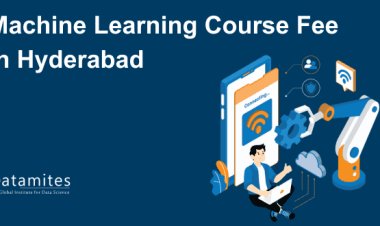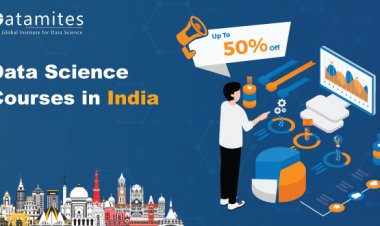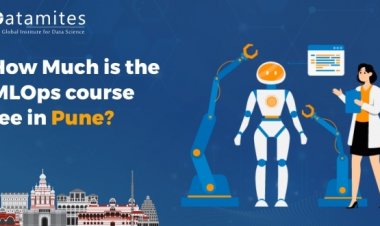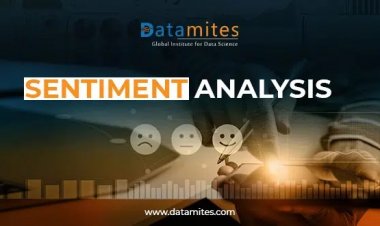Guide to Python Programming Career
Explore the path to a successful Python programming career, from mastering the basics to landing top job roles. Learn essential skills, career opportunities, and tips to grow in the field.
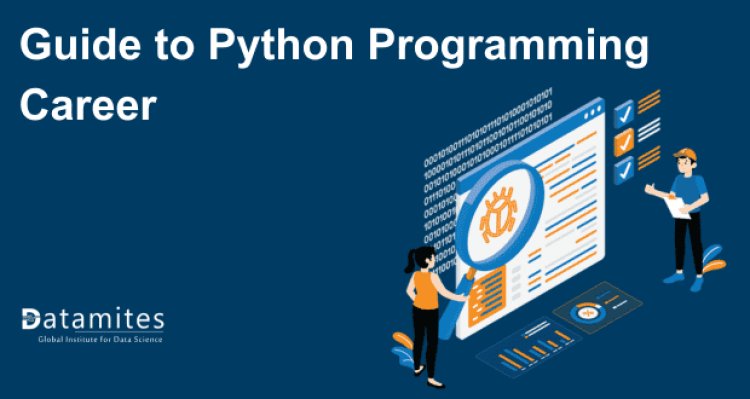
Python programming has become a cornerstone in the modern tech landscape due to its simplicity and versatility. It is widely used in diverse fields such as web development, data science, artificial intelligence, and scientific computing. The demand for skilled Python developers continues to grow, offering a plethora of career opportunities and paths.
Based on a report by Data Bridge Market Research, the global Python web frameworks software market, initially valued at USD 7.75 million in 2021, is projected to reach USD 75.65 million by 2029. This growth represents a compound annual growth rate (CAGR) of 32.95% during the forecast period from 2022 to 2029.
Beginners can start with basic syntax and gradually move to more complex applications, benefiting from Python's extensive libraries and community support. A career in Python programming promises a blend of challenging and rewarding experiences, keeping one at the forefront of technological innovation.
Overview of Python
Python is a high-level programming language known for its clear syntax and readability, making it an excellent choice for beginners and experts alike. Developed by Guido van Rossum and first released in 1991, Python emphasizes code readability and allows programmers to express concepts in fewer lines of code compared to languages like C++ or Java.
Python programming stands out for its simplicity and versatility, making it a favored choice across various industries. As a high-level, interpreted language, Python boasts an easy-to-understand syntax, which makes it accessible to beginners while still powerful for advanced applications. Its significant role in the tech industry is undeniable, with widespread adoption for web development, automation, and software testing, thanks to its extensive libraries and frameworks.
According to a report by Emergen Research, the global Python market is expected to reach a revenue of USD 100.6 million by the year 2030, with a projected Compound Annual Growth Rate (CAGR) of 44.8% over the forecast period
Python's versatility shines in its ability to adapt to different domains, from creating robust web applications to driving innovations in data science and artificial intelligence. This adaptability, combined with a strong supportive community, cements Python's status as a fundamental tool in modern technology development.
Read These Articles:
- Python Libraries For Data Science
- Why Python is Important for Data Science Course
- Do You Prefer Python or Java?
Learning Python
Learning Python involves a comprehensive journey through its basic concepts, various online resources, hands-on projects, and foundational computer science principles. Starting with its fundamental syntax and concepts like variables, loops, and conditional statements, beginners can quickly grasp Python's user-friendly structure.
A wealth of online resources, including interactive tutorials, video courses, and documentation, provide ample learning material for Python courses. For practical experience, beginners are encouraged to work on simple projects like building a calculator, a basic web scraper, or a simple game, which helps in cementing the concepts learned. As one progresses, understanding object-oriented programming, data structures, and algorithms in Python lays a solid foundation for more advanced programming, crucial for tackling complex problems in software development, data science, and other technical fields
Demand for Python Career
The demand for Python careers is widespread and deeply integrated into various industries due to its versatility, readability, and robust library ecosystem. Here's a brief overview of how Python is employed in ten popular industries:
Healthcare: Python is used in healthcare for data analysis, machine learning to predict diseases, medical image processing, and genomics data analysis.
Education: In education, Python serves as a primary language for teaching programming. It's also used in educational research, data analysis, and developing educational software.
Retail: Retailers use Python for data analytics to understand customer behaviour, manage inventory, optimize supply chains, and personalized shopping experiences through machine learning algorithms.
Finance: The finance sector employs Python for quantitative and algorithmic trading, risk management, financial analysis, and data visualization.
Telecommunications: In telecommunications, Python is used for network design and optimization, data analysis, automation of network configurations, and predictive maintenance.
Manufacturing: Python helps in predictive maintenance, streamlining production lines, robotics, and analyzing manufacturing data for quality control.
Automotive: Python is utilized in the automotive industry for data analysis, automation, predictive maintenance, and enhancing vehicle software systems.
Energy: In the energy sector, Python is used for data analysis in oil and gas exploration, renewable energy optimization, and predictive maintenance of energy grids.
Aerospace: Python assists in simulation and testing, data analysis of flight data, and the development of control and navigation systems.
Entertainment: In the entertainment industry, Python is used for animation, game development, data analysis for content recommendations, and automating repetitive tasks in production workflows.
Entering the Python Job Market
Entering the job market with a focus on Python-related career paths is an excellent choice, given the widespread use and versatility of the Python programming language. Let's explore each of these aspects:
Python-Related Career Paths
Python offers diverse career opportunities due to its wide application in various fields. Some of the key Python career paths include:
Python Developer: Python developer focuses on writing server-side web application logic using Python. Python developers often develop back-end components, connect applications with third-party web services, and support front-end developers by integrating their work with Python applications.
Web Developer: Python, with frameworks like Django and Flask, is extensively used for web development. As a web developer, you'll be creating and managing website back-ends and potentially working on server-side logic.
Data Scientist: Python is a mainstay in the field of data science. It's used for data analysis, machine learning, and statistical modeling. This role involves interpreting complex data to help make informed business decisions.
AI Engineer: Python's libraries like TensorFlow and PyTorch make it a popular choice for artificial intelligence and machine learning projects. In this role, you'll be designing and implementing AI models.
Software Developer: Beyond web development, Python is used for developing various kinds of software, including desktop apps, network servers, and more.
Automation and Scripting: Python is also known for its use in automation and scripting to streamline and automate routine tasks, which can be part of various IT roles.
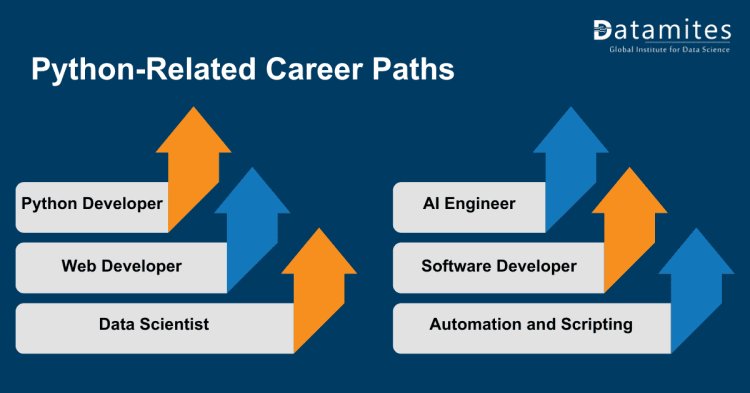
Crafting a Python-Centric Resume
When creating a resume with a focus on Python skills:
Highlight Python Projects: Include any relevant projects where you've used Python. It could be a web application, data analysis project, or even contributions to open-source.
Certifications and Education: List any Python-related certifications, courses, or workshops you've attended.
Skill Proficiency: Mention your proficiency level in Python and related frameworks or libraries.
Problem-Solving Skills: Showcase how you've solved problems using Python in your previous experiences or projects.
Job Searching Strategies
Job Boards and Websites: Regularly check job boards and websites like LinkedIn, Indeed, and Glassdoor for Python-specific roles.
Tailored Applications: Customize your applications and cover letters to match the job description, focusing on your Python skills.
Freelance and Contract Work: Consider taking on freelance projects or contract work to build your experience and portfolio.
Networking and Industry Engagement
Attend Meetups and Conferences: Join Python meetups, conferences, and workshops to network and learn about new opportunities.
Online Communities: Engage in online forums and communities like Stack Overflow, GitHub, or Reddit’s Python threads.
Professional Social Media Presence: Maintain an active LinkedIn profile, showcasing your Python projects and skills.
Mentorship and Collaborations: Seek mentorships, collaborate on projects, or contribute to open-source Python projects to expand your network and experience.
Read These Articles:
- Data Analyst Career Scope in India
- Artificial Intelligence Career Scope in India
- Data Science Career Scope in India
Advanced Python Eligibility and Skills
To determine if you're eligible for advanced Python programming, and to assess the skills needed, consider the following factors:
Advanced Python Eligibility
Basic Understanding of Python: Familiarity with Python syntax, basic libraries, and programming concepts.
Experience in Programming: Prior experience in programming, ideally having completed projects or tasks in Python.
Understanding of Advanced Concepts: Knowledge of advanced Python concepts such as decorators, generators, and context managers.
Familiarity with Object-Oriented Programming: Understanding of OOP principles and their implementation in Python.
Basic Knowledge of Data Structures and Algorithms: An understanding of standard data structures (like lists, dictionaries, sets) and basic algorithms.
Problem-Solving Skills: Ability to solve complex problems and write efficient code.
Willingness to Learn: Eagerness to learn new libraries, frameworks, and stay updated with Python advancements.
Advanced Python Skills
Proficiency in Advanced Python Concepts: Deep understanding of decorators, generators, context managers, and coroutines.
Expertise in Data Handling: Skills in handling, processing, and analyzing data using libraries like Pandas and NumPy.
Web Development Knowledge: Experience in web frameworks like Django or Flask.
Database Management: Ability to work with databases using ORMs or raw SQL queries.
Testing and Debugging: Proficiency in writing unit tests, debugging, and profiling Python code.
Version Control Systems: Familiarity with version control systems, particularly Git.
API Development and Integration: Proficient in API development and integration.
Guide to Python Programming Career: A Roadmap
Starting a Python programming Career can be an excellent choice, as Python is a versatile and widely used programming language in various fields, including web development, data science, machine learning, and automation. Here's a step-by-step guide to help you kickstart your Python programming career:
Learn the Basics of Python:
- Begin with understanding the fundamentals of Python, such as variables, data types, operators, and control structures (if statements, loops).
- Explore functions, modules, and libraries in Python.
Code Regularly:
- Practice is key to mastering any programming language. Write code regularly to reinforce your knowledge and skills.
Explore Python Libraries:
- Python has a rich ecosystem of libraries and frameworks. Familiarize yourself with popular ones like NumPy, Pandas, Matplotlib, and BeautifulSoup (for web scraping) depending on your interests.
Web Development with Python:
- If web development interests you, learn web frameworks like Django or Flask.
- HTML, CSS, and JavaScript are essential for front-end development.
Data Science and Machine Learning:
- To pursue a career in data science or machine learning, delve into libraries such as Scikit-Learn, TensorFlow, and PyTorch.
- Study statistics and linear algebra.
Build Projects:
- Apply your knowledge by working on real projects. Building a portfolio of projects can impress potential employers.
Version Control:
- Learn to use version control systems like Git and platforms like GitHub to collaborate and manage your code.
Collaborate and Network:
- Join online Python communities, forums, and social networks like GitHub, Stack Overflow, and Reddit.
- Attend Python meetups, conferences, and workshops to meet professionals in the field.
Online Courses and Tutorials:
- Consider enrolling in online courses or taking tutorials on YouTube to deepen your knowledge.
Prepare for Interviews:
- If you're aiming for a job in Python programming, prepare for technical interviews. Engage in solving coding challenges and mastering algorithms through platforms such as LeetCode and HackerRank.
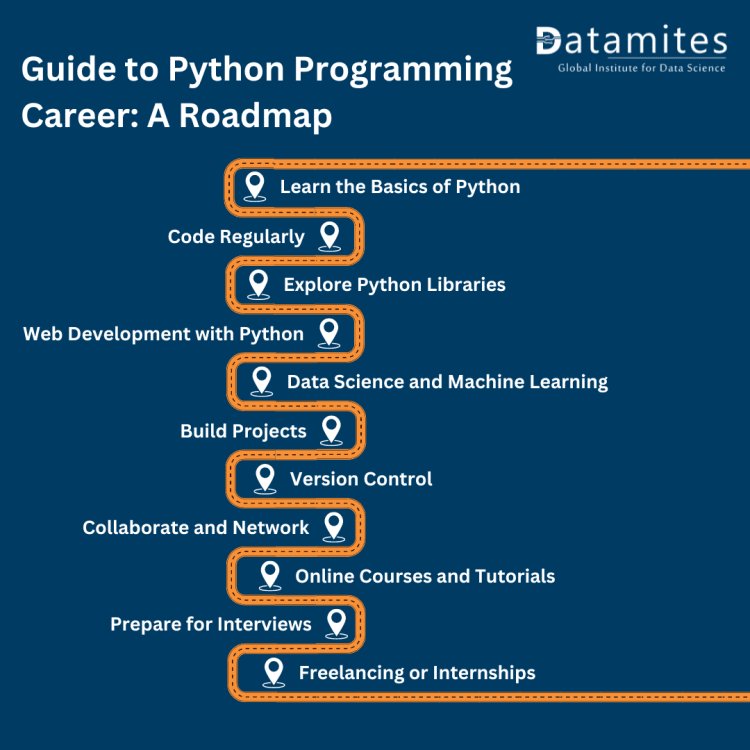
Read These Articles:
Freelancing or Internships:
Consider freelancing or internships to gain practical experience and build your resume.
Worldwide Python Developer Salaries
The salary of a Python Developer in the USA ranges from USD 1,22,529 per year according to an Indeed report.
The salary of a Python Developer in the UK ranges from GBP 71,319 per year according to a Glassdoor report.
The salary of a Python Developer in India ranges from INR 5,35,000 per year according to a Glassdoor report.
The salary of a Python Developer in Canada ranges from CAD 1,50,120 per year according to a Talent.com report.
The salary of a Python Developer in Australia ranges from AUD 1,45,000 per year according to a Talent.com report.
The salary of a Python Developer in South Africa ranges from ZAR 3,90,000 per year according to the PayScale report.
The salary of a Python Developer in UAE ranges from AED 88,095 per year according to an Indeed report.
The salary of a Python Developer in Switzerland ranges from CHF 96,737 per year according to a Glassdoor report.
The salary of a Python Developer in Saudi Arabia ranges from SAR 2,35,462 per year according to a Salary Expert report.
The salary of a Python Developer in Germany ranges from EUR 67,390 per year according to a Glassdoor report.
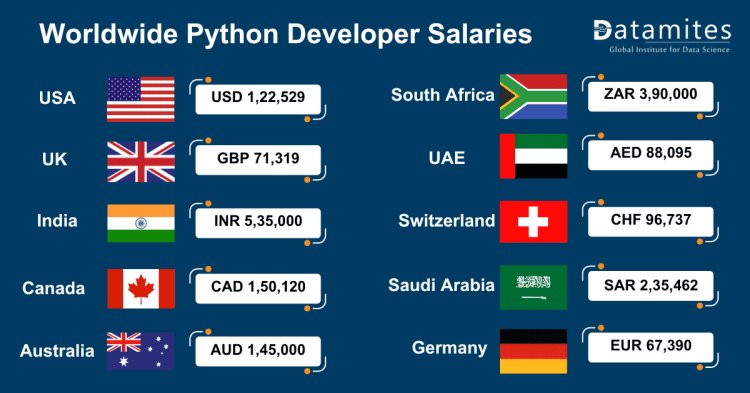
Factors Influencing Python Salary
The salary for Python developers can be influenced by a variety of factors, which include:
Experience and Expertise: Generally, the more experience and expertise a developer has in Python and related technologies, the higher the salary. This includes not only years of experience but also a depth of knowledge in Python and its application in various domains.
Geographical Location: Salaries can vary greatly depending on the country, state, or even city. For instance, Python developers in major tech hubs like San Francisco or New York City often earn more than those in smaller cities or different countries with lower living costs.
Industry: The industry in which a Python developer works can significantly impact salary. Developers in IT industries like finance, technology, and healthcare often command higher salaries due to the critical nature of their work and the revenue they help generate.
Company Size and Type: Larger companies or well-funded startups may offer higher salaries compared to smaller businesses or non-profits.
Education Level: Higher educational qualifications, especially in relevant fields like computer science, can lead to higher salaries. However, this is often balanced with practical experience.
The Future of Python Programming Language
The future of the Python programming language looks promising and dynamic. With its ever-growing popularity in diverse fields like data science, machine learning, web development, and automation, Python is continuously evolving. The Python community is actively working on enhancing its performance, scalability, and versatility.
The introduction of features like type hinting and improved async capabilities in recent versions indicate a shift towards more robust and efficient code. Moreover, Python's simplicity and readability continue to attract new learners, ensuring a steady influx of developers and innovative applications.
End Note:
A career in Python promises a dynamic and evolving landscape, with opportunities in cutting-edge fields like AI and data analytics. Its widespread adoption across industries ensures diverse job prospects and continual learning. Python's community-driven growth fosters a supportive environment for professional development. Overall, Python offers a sustainable and rewarding career path, blending innovation with practicality.
DataMites Institute, globally recognized for its exceptional data science education, provides extensive online and offline Python training. Accredited by IABAC®, their curriculum includes prestigious courses like the 'Certified Python Course' and 'Python for Data Science Course,' addressing the rising need for skilled Python developers in the corporate landscape. The institute offers thorough, practical training, equipping students with essential Python programming skills. Devoted to cultivating the next generation of Python professionals, DataMites is a prominent contributor to Python education in a tech-driven environment.
DataMites Training Institute provides a comprehensive Python course accredited by leading global certification bodies. Endorsed by IABAC and NASSCOM FutureSkills, DataMites focuses on Python programming, data science, and software development. Students benefit from hands-on experience through internships, unlimited projects, and a dedicated practice lab. This immersive learning approach prepares them to thrive in the tech industry.


